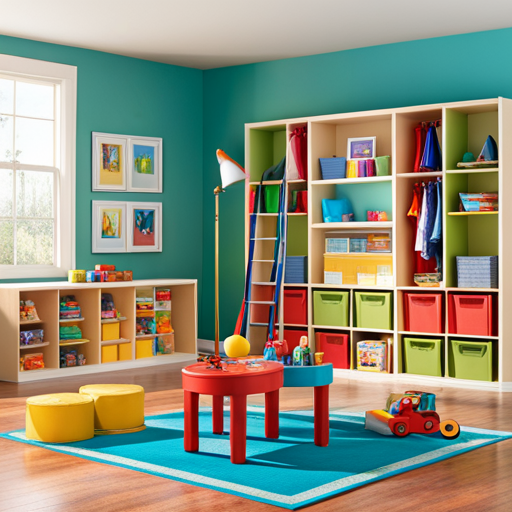"Cherishing Little Steps - A Haven for Baby and Family Journeys"
Boosting Toddler Cognitive Development
Want to give your toddler the best start in life? Have you ever wondered how you can boost their cognitive development? Look no further! In this article, we will explore simple yet effective ways to enhance your toddler’s growing mind.
From stimulating their language skills to encouraging problem-solving abilities, we will guide you through the steps to foster their intellectual growth.
Additionally, we will delve into nurturing creativity and imagination, as well as developing their social and emotional intelligence.
By actively engaging with your toddler and implementing these strategies, you can be confident that you are laying a strong foundation for their future success.
So, let’s dive in and discover how you can boost your toddler’s cognitive development together!
Key Takeaways
- Prioritize early brain development to maximize toddler’s cognitive development
- Expand toddler’s vocabulary through reading age-appropriate and engaging books
- Encourage open-ended play with toys that stimulate critical thinking
- Nurturing creativity and imagination is important for cognitive development
The Importance of Early Brain Development
To maximize your toddler’s cognitive development, it’s essential to prioritize early brain development. During the first few years of life, your child’s brain undergoes rapid growth and development. This critical period lays the foundation for their cognitive skills, which encompass their ability to think, reason, remember, and solve problems.
Brain development in the early years is influenced by a variety of factors, including genetics, environment, and experiences. As a parent, you play a crucial role in nurturing your child’s brain development. Providing a stimulating and supportive environment can help optimize their cognitive growth.
Engaging in activities that promote brain development, such as reading, singing, and playing, can have a significant impact on your toddler’s cognitive skills. These activities stimulate their brain and help develop important neural connections. Additionally, engaging in interactive play and providing opportunities for exploration can enhance their problem-solving abilities and memory retention.
It is also important to note that nutrition plays a vital role in brain development. A balanced diet rich in essential nutrients, such as omega-3 fatty acids and antioxidants, can support healthy brain growth and function.
Stimulating Language Skills
Developing strong language skills is crucial for boosting your toddler’s cognitive development. Language is not only a tool for communication, but it also plays a vital role in shaping your child’s thinking, problem-solving abilities, and social interactions. By expanding your toddler’s vocabulary and using effective language acquisition techniques, you can help them build a solid foundation for their future learning and success.
One effective way to expand your toddler’s vocabulary is through reading. Make reading a part of your daily routine and choose books that are age-appropriate and engaging. As you read, point to the pictures and talk about what you see. Encourage your child to repeat words and ask questions about the story. This will not only enhance their vocabulary, but also improve their comprehension skills.
Another technique to stimulate language skills is through verbal interactions. Engage in conversations with your toddler, even if their responses are limited. Use simple and clear language, and encourage them to express their thoughts and feelings. Repeat and reinforce new words frequently to help them retain and understand the meaning.
To provide a visual representation of vocabulary expansion and language acquisition techniques, here is a table:
| Vocabulary Expansion | Language Acquisition Techniques |
|---|---|
| Reading books together | Engaging in conversations |
| Pointing to pictures | Using simple and clear language |
| Encouraging repetition | Reinforcing new words |
Enhancing Problem-Solving Abilities

Improving problem-solving skills is essential for boosting your toddler’s cognitive development. As your little one grows, their ability to think critically and solve problems becomes increasingly important. Here are five strategies to enhance your toddler’s problem-solving abilities:
-
Encourage open-ended play: Provide your child with toys and materials that allow for imaginative play and problem-solving. Building blocks, puzzles, and art supplies can all stimulate their critical thinking skills.
-
Ask thought-provoking questions: Engage your toddler in conversations that require logical reasoning. For example, when reading a story, ask them how they think the characters could solve a problem.
-
Provide opportunities for decision-making: Allow your toddler to make simple choices throughout the day, such as what clothes to wear or which snack to have. This helps them develop their problem-solving and decision-making skills.
-
Offer challenges: Present your child with age-appropriate puzzles or riddles that require them to think creatively and find solutions. This can be a fun and engaging way to promote critical thinking.
-
Model problem-solving behavior: Set an example for your toddler by demonstrating how to approach and solve problems. Show them that it’s okay to make mistakes and encourage them to think through challenges.
Encouraging Creativity and Imagination

You can easily nurture your toddler’s creativity and imagination by consistently providing opportunities for open-ended play and exploration. Artistic expression and pretend play are two powerful ways to encourage your child’s creativity and help them develop their imagination.
Artistic expression allows toddlers to explore different materials, colors, and textures, giving them the freedom to create their own unique masterpieces. Whether it’s finger painting, coloring with crayons, or molding clay, artistic activities provide a platform for self-expression and allow your child to develop their own sense of style and creativity.
Pretend play, on the other hand, takes your child into a world of make-believe, where they can become anyone or anything they want to be. It stimulates their imagination, encourages problem-solving skills, and helps them develop social and emotional intelligence. By pretending to be a doctor, a superhero, or a chef, your toddler is not only having fun, but also building important cognitive abilities.
To further support your toddler’s artistic expression and pretend play, here are some ideas to incorporate into your daily routine:
| Artistic Expression | Pretend Play |
|---|---|
| Provide a variety of art supplies such as paper, paints, and markers | Create a dress-up box filled with costumes and props |
| Display your child’s artwork proudly to encourage their confidence | Set up a pretend kitchen or doctor’s office for imaginative play |
| Visit art museums or galleries to expose your child to different forms of art | Engage in storytelling and encourage your child to create their own stories |
Nurturing Social and Emotional Intelligence

To enhance your toddler’s cognitive development, focus on nurturing their social and emotional intelligence through meaningful interactions and emotional support. As your little one navigates the world, it becomes crucial to help them develop empathy and build self-confidence.
Here are some ways you can foster their social and emotional growth:
-
Encourage sharing and turn-taking: By teaching your child the importance of sharing and taking turns, you’re helping them understand the needs and feelings of others. This promotes empathy and cooperation.
-
Provide opportunities for playdates: Interacting with other children in a safe and supervised environment allows your toddler to practice social skills, such as sharing, taking turns, and communicating their needs.
-
Validate their emotions: Acknowledge and validate your toddler’s feelings, whether they’re happy, sad, or frustrated. This helps them develop emotional intelligence and learn how to express their emotions effectively.
-
Engage in pretend play: Pretend play allows your child to explore different roles and scenarios, fostering their imagination and social skills. Join them in their imaginative play to encourage interaction and creativity.
-
Offer praise and encouragement: Celebrate your toddler’s achievements, no matter how small. By acknowledging their efforts, you’re building their self-confidence and motivating them to continue exploring and learning.
Frequently Asked Questions
How Can I Help My Toddler Develop Their Motor Skills?
You can help your toddler develop their motor skills by providing opportunities for them to explore and play. Encourage them to use their hands and feet, and engage in activities that promote language development and problem-solving skills.
What Are Some Effective Strategies for Promoting Memory and Attention in Toddlers?
To promote memory and attention in toddlers, try these techniques: use interactive games to enhance focus, engage in storytelling for improved working memory, and provide a structured routine that encourages concentration.
Are There Specific Activities or Toys That Can Enhance My Toddler’s Cognitive Development?
Engage your toddler’s cognitive development with specific activities and toys. Incorporate music into their routine as it plays a significant role in fostering cognitive skills. Make learning fun and interactive for your little one!
How Can I Support My Toddler’s Social-Emotional Development During Playtime?
During playtime, you can support your toddler’s social-emotional development by engaging in activities that promote bonding and communication. Encourage pretend play and use toys that encourage empathy and sharing. These strategies will boost their memory and attention skills.
What Are Some Ways to Foster Curiosity and a Love for Learning in My Toddler?
You can foster curiosity and a love for learning in your toddler by incorporating play-based learning. It not only keeps them engaged and excited, but also enhances their cognitive development and helps them develop important skills for the future.
Conclusion
Congratulations! By implementing strategies to boost your toddler’s cognitive development, you’re embarking on an exciting journey of nurturing their potential.
Through stimulating language skills, enhancing problem-solving abilities, and encouraging creativity and imagination, you’re laying the foundation for their future success.
Additionally, by nurturing their social and emotional intelligence, you’re fostering well-rounded individuals who’ll thrive in all aspects of life.
Embrace this opportunity to create a bright and brilliant future for your little one!


